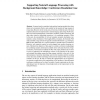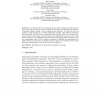20 search results - page 4 / 4 » Integrating Multiple Knowledge Sources to Disambiguate Word ... |
IJCAI
2001
13 years 7 months ago
2001
The ability to handle exceptions, to perform iterated belief revision and to integrate information from multiple sources are essential skills for an intelligent agent. These impor...
SEMWEB
2010
Springer
13 years 3 months ago
2010
Springer
Systems based on statistical and machine learning methods have been shown to be extremely effective and scalable for the analysis of large amount of textual data. However, in the r...
JUCS
2002
13 years 5 months ago
2002
: Community web sites exhibit the property that multiple content providers exist. Of course, any portal is only as useful as the quality and amount of its content. Developing origi...
IJAR
2007
13 years 5 months ago
2007
When integrating data coming from multiple different sources we are faced with the possibility of inconsistency in databases. A paraconsistent approach for knowledge base integra...
JMLR
2011
13 years 22 days ago
2011
We propose a framework MIC (Multiple Inclusion Criterion) for learning sparse models based on the information theoretic Minimum Description Length (MDL) principle. MIC provides an...


